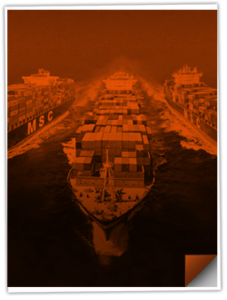Featured Headlines:
FDA Prescribes New Drug Guidance to Alleviate Import Pains
Section 301 Tariff Exclusions Extended for COVID Products
New AIM License Requirements— Whoever Smelt It, Dealt It!
US Considers Adding Chinese Companies to Economic Blacklist
It's a Hard-Knock Life to Dwell On
A Hapag-Lloyd Acquisition Just Happened
US West Coast Port Labor Negotiations
Russian Container Market Update
Spot Pricing Dominates Air Cargo Booking
A High Altitude Air Freight Update
Shanghai Shipping Slowly Shaping Up
FDA Prescribes New Drug Guidance to Alleviate Import Pains
- The US Food and Drug Administration (FDA) recently released a Small Entity Compliance Guide to help importers of prescription drugs from Canada better understand the Importation of Prescription Drugs Final Rule (85 FR 62094), which was originally published on October 1, 2020 to reduce costs for American consumers.
- The FDA guidebook—issued in May—includes a detailed outline of Section 804 Importation Program (SIP) eligibility requirements, as well as additional information related to entry, labeling and testing.
- For more drug-related resources, visit the FDA website or contact [email protected].
Section 301 Tariff Exclusions Extended for COVID Products
- Last Friday, the US Trade Representative (USTR) announced a 6-month extension of Section 301 tariff exclusions for 81 products used to treat COVID; the exclusions were previously set to expire on May 31st but will instead continue until November 30th.
- Importers with products meeting the specified descriptions are encouraged to apply for an exclusion.
- Click here to view the official Federal Register Notice.
- If you have any questions related to Section 301 tariffs, please contact [email protected].
New AIM License Requirements— Whoever Smelt It, Dealt It!
- The Department of Commerce announced that both the “country of largest smelt” and “country of second largest smelt” fields will need to be provided on Aluminum Import Monitoring (AIM) licensing applications beginning June 29, 2022.
- Importers were temporarily permitted to indicate “unknown” on the applications for one year upon implementation of a final rule published in May 2021 (19 CFR 361); however, Commerce officials have now determined that a grace period is no longer needed to adjust to the regulations.
- Trade officials will be hosting brief virtual office hours to answer questions about the AIM or the import licensing system on Tuesdays (11AM) and Thursdays (3PM); they are also offering virtual public license application demos on Wednesday, June 15 at 10AM and Monday, June 27 at 2PM.
- For more information, please visit the Aluminum page on AIM’s website or contact [email protected].
US Considers Adding Chinese Companies to Economic Blacklist
- US Commerce Secretary Gina Raimondo admitted that the Biden administration is actively considering adding new Chinese companies to the government’s economic blacklist as it investigates what it calls “efforts by China to evade U.S. sanctions.”
- Last year, China’s embassy in Washington said the United States “uses the catch-all concept of national security and abuses state power to suppress and restrict Chinese enterprises in all possible means.”
It's a Hard-Knock Life to Dwell On
- Average rail container dwell times in Los Angeles–Long Beach reached 9.6 days in April, up from 7.7 days in March; this is about three times higher than the level needed to maintain port fluidity, according to the Pacific Merchant Shipping Association.
- The average rail container dwell time in Oakland was about 9 days for the month and was “double digits” at the Northwest Seaport Alliance (NWSA) of Seattle and Tacoma.
- Long-dwelling rail containers are also the biggest obstacle to port fluidity in Southern California. In addition to the lack of rail capacity, West Coast ports continue to experience chassis shortages, with equipment carrying laden inbound containers stuck at shipper-receiving facilities because of delays in unloading.
US Markets Looking Rail Thin
- BNSF Railway is struggling to move containers in three US inland markets due to a chassis shortage forcing drivers to wait hours to get a load; as a result, BNSF has begun grounding containers in Memphis and Kansas City in the last 4 weeks.
- The average turn time in BNSF Logistics Park Chicago (LPC) was 76 minutes last month; this compares to 53 minutes in April 2021.
- Union Pacific Railroad is also having chassis issues; they have warned customers of a marine chassis shortage that will force them to stack containers near one port and four inland hubs.
- UP will not allow truckers to use privately-owned chassis to remove boxes; the railroad communicated that they will not extend free time or waive rail demurrage because of the chassis shortage.
Gas Prices: Up, Up and Away…!
- The national average price for diesel dropped 3.2 cents to $5.539 a gallon, according to Energy Information Administration (EIA) data released May 30.
- Trucking’s main fuel has shed 8.4 cents over three consecutive declines since an 11.3-cent spike May 9. A gallon of diesel now costs $2.284 more than in 2021!
- Diesel’s price fell in 7 of the 10 regions in EIA’s weekly survey—New England and the Central Atlantic registered the biggest drops at 14.5 cents and 10 cents a gallon, respectively, while the West Coast (less California) had the largest increase at 6.7 cents.
- Gasoline moved in the opposite direction of diesel, rising an average of 3.1 cents to $4.624. A gallon now costs $1.597 more than it did last year.
A Hapag-Lloyd Acquisition Just Happened
- Hapag Lloyd acquired a container liner business of Africa specialist Deutsche Afrika-Linien (DAL); the deal was completed between the parties after approval by worldwide antitrust authorities.
- DAL is an established liner shipping company for the transportation of containerized cargo; it operates with four liner services between Europe, South Africa and the Indian Ocean.
- The acquisition supports the carrier’s strategy to grow in the South African market; in 2021, Hapag-Lloyd had acquired Africa-specialized carrier Nile Dutch, which significantly strengthened the carrier’s presence and service offering to and from West Africa.
US West Coast Port Labor Negotiations
- Contract talks started on May 10th between the Pacific Maritime Association (PMA) and International Longshore and Warehouse Union (ILWU)—the two parties that represent many of the companies and workers responsible for keeping US West Coast ports in operation.
- Shippers are hedging against the risk of West Coast labor disruptions by shifting cargo volumes to US East and Gulf Coast ports. In 2021, the West Coast’s share of imports from Asia fell to 58.2% percent (down from 60%).
- According to Jim McKenna, PMA’s CEO, the previous 4 negotiations have gone past the July 1st deadline; and 3 of those negotiations resulted in work slowdowns or an employer lockout. The last round of negotiations that took place in 2014 lasted for 9 months; however, it took the industry another 8 to 9 months to return to normal operations.
- Officials at the PMA and ILWU have said the close collaboration forged during the pandemic helped create a healthy relationship between the parties. “I don’t think either of us walks in and says we’re going to have a problem. We both committed to getting to the table, getting a contract, and doing so without any disruption to the supply chain…,” noted McKenna.
Russian Container Market Update
- Russian liner operator Far Eastern Shipping Company (FESCO) has launched a service connecting the Russian Far East with China and Vietnam, after the Israeli container line ZIM pulled out of the route. The service connects the port of Vladivostok with Hai Phong, Ho Chi Minh City and Ningbo.
- Alphaliner’s report today disclosed that COSCO Shipping Lines has followed its peers in limiting calls to Russia. The Chinese liner operator will close its North Europe – Russia RFS service, which called at Zeebrugge, Hamburg, St Petersburg and Zeebrugge, using two 1,924 TEU 1A ice-class ships chartered from Delphis.
FMC Releases Findings
- Several months ago, the Federal Maritime Commission (FMC) encouraged importers and exporters to share their pandemic-related shipping concerns. Comments included the high cost of shipping cargo and the excessive charges for demurrage and detention.
- Commissioner Dye said that “the historically high freight rates experienced recently by US exporters and importers have been devastating to many, but I want to emphasize that the Commission has done its job during the Covid-19 pandemic to enforce our competition authority.”
- Dye went on to explain, “Our markets are competitive and the high ocean freight rates have been determined by unprecedented consumer demand, primarily in the United States, that overwhelmed the supply of vessel capacity. Congestion further constrained available capacity.”
- Commissioner Rebecca Dye writes: “The commission lacks the regulatory tools to deal with the numerous new charges imposed on US shippers and truckers by ocean carriers and marine terminals through tariffs and with other supply chain dislocations.”
Spot Pricing Dominates Air Cargo Booking
- Prior to the pandemic, airlines had relied on offering fixed-rate pricing to their customers for air cargo bookings.
- During the pandemic, in response to capacity issues and operational disruptions, airlines offered spot quotes to customers; this provided them with greater flexibility to properly rate shipments.
- As the pandemic continued, these carriers invested heavily in technology and processes to be able to offer spot quotes more efficiently and effectively.
- These investments seem to have paid off; airlines can now offer dynamic spot quotes to customers quickly. This may become the industry standard!
A High Altitude Air Freight Update
- Ethiopian Airlines joins the long list of airlines investing heavily in Freighters to handle their air cargo product. This trend continues to expand across several airlines, driving a shift away from the 50/50 capacity cargo utilization between Freighter vs. Passenger.
- The rising cost of fuel has led Qantas to decrease the number of flights available in Australia—which should result in more seats filled per flight, thereby reducing the impact of high fuel costs. Fares are also on the rise; this will help to offset the increased costs.
- Delta has announced that it will cut 100 flights a day in the US and Mexico to ‘relieve pressure’ on their operations. Delta’s operations have struggled due to instances of bad weather and unprecedented worker absences; cutting 100 flights a day should help alleviate some of the pressure weighing down its operations.
Shanghai Shipping Slowly Shaping Up
- Due to declining COVID cases, authorities in Shanghai have lifted some of the lockdown measures imposed on businesses.
- Plans have also been introduced to support the city’s economy, which has been hit hard by the restrictions. The commercial center had been under a strict lockdown for almost two months.
- Meanwhile, China’s capital, Beijing, has reopened parts of its public transport system, as well as some shopping malls and other venues as infections ease.
- Once Shanghai fully lifts its lockdown, shippers will face manufacturing backlogs, full warehouses, equipment and trucking shortages, and, inevitably, landside congestion. We expect the air freight demand will increase in the coming weeks; we encourage shippers to make booking arrangements in advance.



